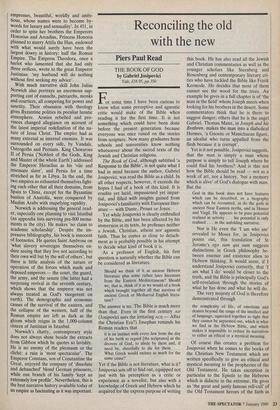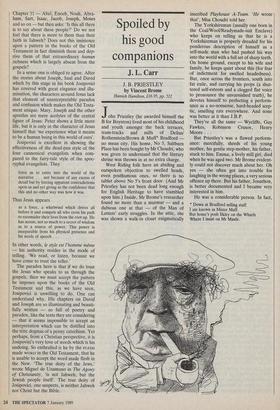Reconciling the old with the new
Piers Paul Read
THE BOOK OF GOD by Gabriel Josipovici Yale, f18.95, pp.350 For some time I have been curious to know what some perceptive and agnostic critic would make of the Bible when reading it for the first time. It is not something which could have been done before the present generation because everyone was once raised on the stories from scripture. Now many graduates from schools and universities know nothing whatsoever about the sacred texts of the Jewish and Christian religions.
The Book of God, although subtitled 'a Response to the Bible', is not quite what I had in mind because the author, Gabriel Josipovici, was read the Bible as a child. In all other respects, however, it exceeds the hopes I had of a book of this kind. It is erudite yet lucid, impassioned yet impar- tial, and filled with insights gained from Josipovici's familiarity with European liter- ature — with Dante, Proust or Joyce.
Yet while Josipovici is clearly enthralled by the Bible, and has been affected by his immersion in its texts, he professes neither a Jewish, Christian, atheist nor agnostic faith. Thus he comes as close to detach- ment as is probably possible in his attempt to decide what kind of book it is.
As a professor of English, his first question is naturally whether the Bible can be considered as literature.
Should we think of it as ancient Hebrew literature plus some rather later literature from the Eastern Mediterranean? Should we, that is, think of it as we would of a book which brought together all that survives of ancient Greek or Mediaeval English litera- ture?
The answer is no. The Bible is much more than that. Even in the first century AD (Josipovici uses the irritating ACE - After the Christian Era?) Josephus reminds his Roman readers that
it is an instinct with every Jew from the day of his birth to regard [the scriptures] as the decrees of God, to abide by them and, if need be, cheerfully to die for them. . . . What Greek would endure as much for the same cause?
Yet if the Bible is not literature, what is it? Josipovici sets off to find out, equipped not just with his perception as a critic or experience as a novelist, but also with a knowledge of Greek and Hebrew which he acquired for the express purpose of writing this book. He has also read all the Jewish and Christian commentaries as well as the younger scholars like Sternberg and Rosenberg and contemporary literary cri- tics who have tackled the Bible like Frank Kermode. He decides that most of them cannot see the wood for the trees. An example he gives in a full chapter is of 'the man in the field' whom Joseph meets when looking for his brothers in the desert. Some commentators think that he is there to suggest danger; others that he is the angel Gabriel. Thomas Mann, in Joseph and his Brethren, makes the man into a diabolical Hermes, 'a Gnostic or Manichaean figure, an idealist who turns appalled from the flesh because it is corrupt'.
Yet is it not possible, Josipovici suggests, that the man is simply a man whose purpose is simply to tell Joseph where he could find his brothers? And is this not how the Bible should be read — not as a work of art, nor a history, 'but a memory which is alive' of God's dialogue with man. But the
God in this book does not have features which can be described, or a biography which can be recounted, as do the gods in ancient Near Eastern myths, and in Homer and Virgil. He appears to be pure potential realised in activity . . . his potential is only realised . . . in the unfolding narrative.
Nor is He even the 'I am who am' revealed to Moses for, as Josipovici points out, this translation of St Jerome's ego sum qui sum suggests distinctions in Greek philosophy be- tween essence and existence alien to Hebrew thinking. It would seem, if I understand Josipovici correctly, that 'I am what I do' would be closer to the truth, and the Bible is principally God's self-revelation through the stories of what he has done and what he will do.
The very majesty of God is therefore demonstrated through
the complexity of life, of emotions and desires beyond the range of the intellect and of language, squeezed together so tight that they cannot be separated out, which is what we find in the Hebrew Bible, and which makes it impossible to reduce its narratives to either an ethical or a mystical meaning.
Of course this creates a problem for Josipovici when he comes to the books of the Christian New Testament which are written specifically to give an ethical and mystical meaning to the prophecies of the Old Testament. He takes exception in particular to the Epistle to the Hebrews which is didactic in the extreme. He gives us 'the great and justly famous roll-call' of the Old Testament heroes of the faith in Chapter 11 — Abel, Enoch, Noah, Abra- ham, Sart, Isaac, Jacob, Joseph, Moses and so on — but then asks: 'Is this all there is to say about these people?' Do we not feel that there is more to them than their faith in Jahweh? Does not this insistence upon a pattern in the books of the Old Testament in fact diminish them and dep- rive them of that extraordinary human richness which is largely absent from the gospels?
In a sense one is obliged to agree. After the stories about Joseph, Saul and David which by this stage in his book Josipovici has covered with great elegance and illu- mination, the characters around Jesus lack that element of uninterpretable paradox and confusion which makes the Old Testa- ment unique. Mary, Joseph and the other apostles are mere acolytes of the central figure of Jesus: Peter shows a little more life, but it is only in the character of Jesus himself that 'we experience what it means to be a human being in this world of ours'.
Josipovici is excellent in showing the effectiveness of the dead-pan style of the four cannonical evangelists when com- pared to the fairy-tale style of the apoc- ryphal evangelists. They
force us to enter into the world of the narrative . . . not because of any excess of detail but by forcing apparent contradictions upon us and yet giving us the confidence that this and no other way was how it was.
Thus Jesus appears
as a force, a whirlwind which drives all before it and compels all who cross his path to reconsider their lives from the root up. He has access, not so much to a secret of wisdom as to a source of power. This power is inseparable from his physical presence and his mode of speech . . .
In other words, le style est l'homme meme — his authority resides in the mode of telling. 'We read, or listen, because we have come to trust the teller.'
The paradox here is that if we do trust the Jesus who speaks to us through the gospels, then we must accept the pattern he imposes upon the books of the Old Testament and this, as we have seen, Josipovici is unwilling to do. One can understand why. His chapters on David' and Joseph are so illuminating and beauti- fully written — so full of poetry and paradox, like the texts they are considering — that it seems impossible to accept an interpretation which can be distilled into the trite dogmas of a penny catechism. Yet perhaps, from a Christian perspective, it is Josipovici's very love of words which is his undoing. So enthralled is he by the FLESH made WORD in the Old Testament, that he is unable to accept the word made flesh in the New. 'The true deity of the Jews,' wrote Miguel de Unamuno in The Agony of Christianity, 'is not Jahweh, but the Jewish people itself'. The true deity of Josipovici, one suspects, is neither Jahweh nor Christ but the Bible.











































 Previous page
Previous page